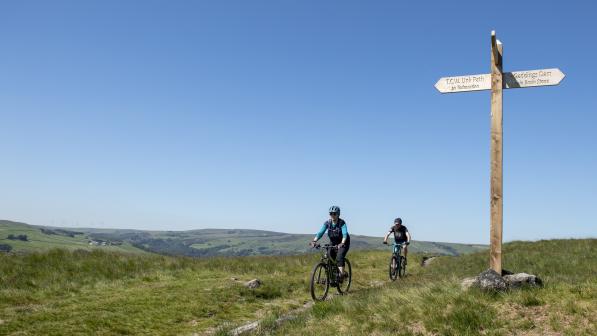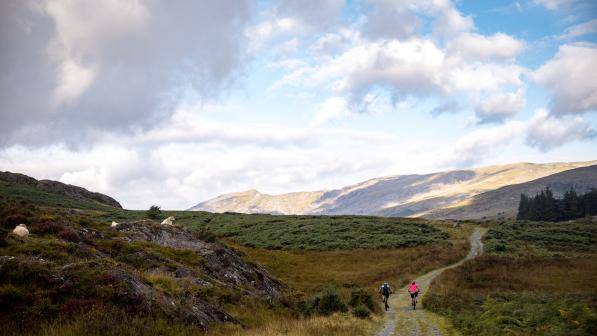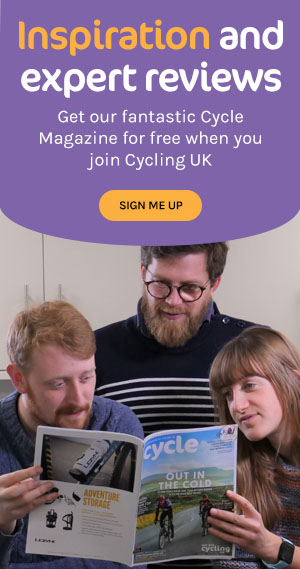Getting access to Wales’s rights of way network back on track

Cast your mind back to spring 2019. The Welsh Government made a visionary commitment to increase access to the outdoors, with the then deputy minister Hannah Blythyn promising to “facilitate an assumption of non-motorised multi-use on access land and the public rights of way network”.
This was hugely exciting – a culmination of years of campaigning. During two rounds of consultation on public access to the countryside, Cycling UK and off-road advocacy group OpenMTB mobilised 12,000 people to respond in support of widening access rights.
The Welsh Government listened and promised to deliver change, including making rights of way multi-use by default (which would enable cycling on most, but not all, public footpaths), and relaxing restrictions on open access land to allow a wider variety of activities. So far, so good.

Access delayed
Since then, it’s all gone quiet. Four years later, no decisions have been made on how to implement the proposals. We knew change wouldn’t happen overnight.
Following the announcement, Cycling UK and OpenMTB joined other outdoor organisations and land manager representatives on expert advisory groups to thrash out the details of how the access reform proposals should work in practice. How should it be decided if a path isn’t suitable for shared use? How can changes to access be communicated in a way that is clear and promotes responsible use?
Those meetings began purposefully in early 2020. As we all know, many best-laid plans were thoroughly derailed in 2020. After several delays, a report was presented to the Welsh Government at the end of 2021, setting out the conclusions from the expert discussions.
Unfortunately, rather than making clear recommendations for what to do next, the report merely outlined the options and kicked it back to the government to decide. That’s when things stalled. Access reform was in danger of slithering uncontrollably to the bottom of the political agenda like a mountain biker on a muddy slope.
The path ahead
Cycling UK’s engagement officer for Wales, Gwenda Owen, was busy behind the scenes to ensure that didn’t happen. She explains: “As part of the Cross Party Group for the outdoor activity sector, we’ve been working alongside other organisations to highlight the benefits that increasing access would bring, and remind politicians that this is something they have already committed to do. It’s too important to be forgotten about.
“To move things forward, we suggested trialling the changes in a few places, with a mix of locations – some rural and some on the edge of towns. The idea is to test how the access reform proposals could work in practice over a limited area, before bringing in changes on a wider scale. The minister has been open to considering that, so we’re hoping it will provide us with a way ahead.”
The next challenge will be getting Members of the Senedd on board to champion access reform. We’ve produced a report that sets out the strong case for increasing access to the countryside, to boost health and wellbeing and strengthen the rural economy.

Cycling matters
Cycling is the activity that people would most like to do more of, according to the latest National Survey for Wales, and it’s already the second most popular outdoor activity after walking. More cycling can only be a good thing, as a third of Welsh adults are active for less than half an hour a week. However, it’s not always simple to know where you can ride.
Only a fifth of rights of way in Wales are open to cyclists, and they often don’t link up. Cycling UK’s survey of off-road riders found that 74% of them believe the rights-of-way system is not suitable for modern-day use, and over 80% said the current network “often” or “sometimes” makes it difficult to put together a legal route.
One respondent to that survey described how off-road riding enables him to maintain his mobility and freedom, and why he feels more paths need to be opened up for cycling: “Living on the edge of the Brecon Beacons, using footpaths allows me to get to areas and enjoy the natural beauty that only walkers are able to. I have had both hips replaced and want to be able to get to these places – and [off-road riding] allows me to do this.”
Stories from real people, and examples of specific places where increasing access could make a real difference, say more than statistics ever can about the benefits that it could have on people’s lives. If you know of a path in Wales where it would make sense for cycling to be permitted, we’d love to hear from you. Please send a photo and details of where it was taken to the Cycling UK campaigns team.
Even better, tell your MS about it, and ask what the next steps are for increasing access to the outdoors. We’ll be building support in the Senedd to reignite that visionary spark from four years ago and finally get some momentum to increase access to Wales’s fantastic countryside – however you choose to explore it.






